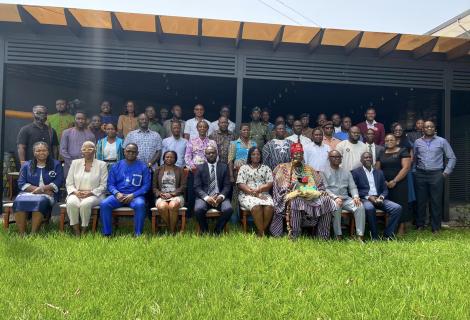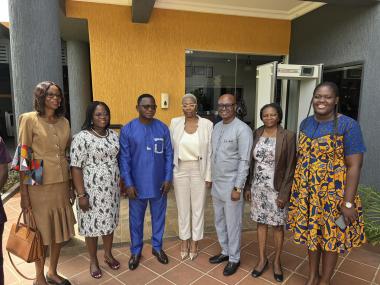ActionAid calls on CHRAJ to integrate gender issues in the National Action Plan on Business and Human Rights

The emergence of a global market which allows commercial, financial and labour exchange among countries without restrictions presents complex challenges for the protection of the human rights. The multinational corporations that operate across many borders have gained power and influence across the countries they operate in. Their influence is in some instances considered as positive and negative. The positive influence stems from their ability to create jobs, invest in technology to transform the lives of community members and the provision of infrastructure through their social responsibility programmes. Aside these positive influence corporations have on the communities in which they operate, their operation in some instances violates the human rights of the communities in which they operate. Many of these companies exploit weak and poorly enforced local regulations which results in devastating effects on communities.
Some participants at the event
In Ghana, the value chain of some corporations have been cited for land grabbing, forced labour, unfair contract practices, child labour among others. In Mion in the Upper East region, community who have been resettled due to a mining activity, describe the resettlement as a lost in their identity. For many of the women in this community, their new community has increased the care burden on women due to their lack of access to water. The many harrowing stories told by people (communities and staff) of corporations, places an obligation on states to be on alert to prevent, investigate and punish rights violations perpetuated by corporations and institutions.
In response to the calls by human rights activists for the protection of human rights, the UN Human Rights Council in 2011 unanimously endorsed the UN Guiding Principles (UNGPs) on Business and Human Rights. The UNGPs is a set of guidelines that operationalise the UN Framework and further define the key duties and responsibilities of States and business enterprises regarding business-related human rights abuses. The UNGPs are founded on three pillars which are; the State’s duty to protect human rights, the corporate responsibility to respect human rights and the need for greater access to an effective remedy for victims.
The endorsement places obligations on States to meet their duty to protect human rights in the context of business operations, including enacting and enforcing laws that require businesses to respect human rights; creating a regulatory environment that facilitates business respect for human rights; and providing guidance to companies on their responsibilities to respect human rights across the value chain, act with due diligence and address adverse impact of their actions.
In response to these obligations as a member of the United Nations, the government of Ghana through the Commission on Human Rights and Administrative Justice (CHRAJ) has begun the development of a National Action Plan (NAP) on Business and Human Rights to enable the country to implement the UNGPs.
A group shot of committee members and staff of ActionAid.
The workshop brought together representatives of institutions such as the Fire Service, Police Service, department of gender, children and social protection, members of the regional house of chiefs, Ghana Education Service and members of communities that have been affected by the operations of businesses.
Jaladeen Abdulai, Upper East Regional Director of CHRAJ, noted that the consultative meeting is in line with the Steering Committee’s roadmap to engage stakeholders on the UNGPs and solicit their input into the development of the NAP.
Mary Nartey, a Co-Chairperson of the NAP Steering Committee, said, the operations of businesses sometimes result in environmental pollution, indecent work practices among others which threaten the livelihood of community members who suffer the devastating impacts of these actions, therefore the development and subsequent adoption of a NAP on Business and Human Rights will position Ghana as a country that is committed to the promotion and protection of human rights.
Developing the National Action Plan with a Feminist lens
The development of the National Action Plans on Business and Human Rights in Ghana, offers the country the opportunity to join the only two countries in Africa (Kenya and Uganda) that have developed a NAP in line with the UN Guiding Principles. However, one of the key concerns of ActionAid is to ensure that stakeholders do not push feminist issues to the back burner during the consultation processes.
John Nkaw, Country Director of ActionAid Ghana, said: As we applaud the government for this giant step, I join the many voices to call on the Steering Committee and all gathered to go through the process with a gender responsive lens. It behooves on us to ensure that gender issues are not relegated to the background but integrated into the plan.
Beyond the voluntary UN Guiding Principles, the rest of the world is fast advancing towards a legally binding instrument to promote business and human rights. In line with this, ActionAid would like to impress upon the Government to take keen interest and actively participate in the textual Intergovernmental negotiations on the United Nations Binding Treaty."
Group discussion during the consultative meeting
Participants at the consultative workshop
Persília Muianga de Gouveia, Business and Human Rights Coordinator, ActionAid International, said, the activities of business enterprises profoundly impact the human rights of employees, consumers, and communities wherever they operate through increase access to employment, improve public services, pollute the environment, underpaying of workers or forcibly evicting communities.
"Globally, the activities of businesses impact women differently and disproportionately. Women are faced with barriers to access justice, discrimination in the labour market, gender-based violence, uneven domestic workloads and unpaid care and discrimination in the labour market. she added.
Combatting Modern Slavery in Ghana
In Ghana, ActionAid is implementing the project in partnership with the General Agricultural Workers Union. The project has since its inception built the capacities of state institutions to implement measures to prevent, identify and protect vulnerable groups and victims of modern slavery. The project has also resulted in a collaboration with businesses to implement anti-modern slavery measures to prevent, identify and tackle the use of human trafficking and forced labour, including the worst forms of child labour, in their operations and supply chains.
Additionally, ActionAid has successfully collaborated with the Chamber of Agribusiness Ghana to roll-out a Decent Work Charter which seeks to promote sustained, inclusive, and decent work for all. The Charter also provides standards that regulate employment within the agribusiness value chain.
